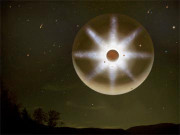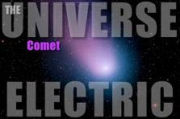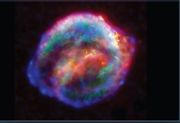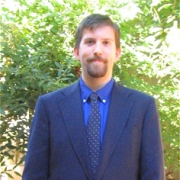|
|
A Tale of Earth Life Seeded from Ceres…
by Michael Gmirkin
|
|
March 28, 2009
|
|
|
|
“Will Mr. Isaac Newton Please Yield the Floor to Mr.
Isaac Asimov?” Sometimes art imitates life. Sometimes life
imitates art. In this case, a little science fiction is
written as though it is a lot of science fact. But will
discerning scientists stand for it?
|
|
|
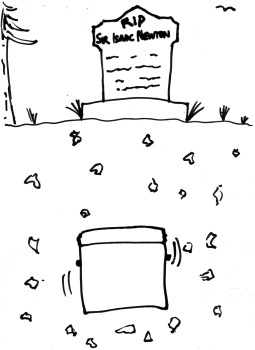
Sir Isaac Newton turns in his grave...
Credit: Dave Smith/Thunderbolts Project
[Click to enlarge]
|
|
|
In a recent article from Space.com, entitled
"Could
Life on Earth Have Come From Ceres ", scientists speculate
on the possibility that life could have evolved elsewhere. In this
case, they speculate that it could have formed on the minor planet
(large round asteroid) Ceres in the cold outer depths of the solar
system.
Scientists seem fixated upon determining whether or not we are
alone in the universe and conjecturing upon the myriad imaginative
ways in which it may have evolved here on Earth and elsewhere.
Thus far, it seems like a miracle that we’re even here with the
ability to discuss such esoteric subjects. In the current theory
of solar system formation, the early solar system was a violent
and chaotic place with collisions between bodies common. Likewise,
high temperatures and atmospheric chemical compositions may have
been moderately to highly unfriendly to life. Yet, here we stand.
“The evidence points to Ceres having remained relatively
unscathed during the
Late Heavy Bombardment
[hypothetical period of the solar
system],” states Houtkooper.
[…]
This leads to an interesting hypothesis. If the Earth was sterilized
by colossal impacts, but Ceres hosted life which survived, could the
dwarf planet have reseeded our world with life, via rock fragments
that chipped off Ceres and then crashed into Earth? Are all organisms
on Earth, including humans, descendants of Ceres?
Here Houtkooper seems to invent a problem and then go about solving
it. What if life might have been forming on Earth, but been wiped
out by impacts? Well, then maybe some other body had life and ejected
pieces of it re-seeded life here.
Clever! But is this a real problem or one dreamed up in
order to have a problem to solve?
Having a problem now in hand, Houtkooper goes about solving it.
He attempts to figure out whether any bodies would be capable of
having ejecta reach Earth without being intercepted by another
body along the way.
Houtkooper then calculated the orbital paths of candidate planets,
moons and asteroids to see which were in the best positions to
have pieces successfully reach the Earth, without being intercepted
by other objects. Ceres fared favourably in these calculations.
Filtering out bodies with a low probability of ejecta reaching
Earth (not unlike filtering out non-prime numbers using the Sieve
of Eratosthenes), Houtkooper comes up with Ceres as a possible
prime candidate.
He then considers the likelihood of the scenario actually working.
Where could life have existed? What form would it have taken? Would
it still have existed at the time of an impact ejecting material
into space? Would it have survived the trip and made it to Earth?
Houtkooper considered the possibility of organisms still being
present on Ceres. “In the ocean, there could be life,”
he suggests. “On the surface, it would be more difficult.
But there are some possibilities. There could be hydrogen
peroxide-based life, able to withstand the low temperatures.“
It's not currently known whether hydrogen peroxide is present on
Ceres, but nothing rules it out, either.
It all seems well and good as a back-of-the-envelope thought
experiment. But does it prove anything? Is it based upon any
actual existing data? Does hydrogen peroxide-based life exist?
Is hydrogen peroxide even present on Ceres?
The last sentence of the preceding quote should raise the hackles
of a good scientist: “It's not
currently known whether hydrogen peroxide is present on Ceres,
but nothing rules it out, either.”
This is a rather flimsy justification for the thought experiment.
One could just as easily say “nothing rules out finding
leprechauns on Mars.” Should we, in honor of St. Patty’s
Day, engage in idle daydreams about how leprechauns might have
evolved on Mars and then spend copious time and resources trying
to figure out the exact process by which they hypothetically could
have come to be? I would argue that we should not.
In the article, the issue is only briefly mentioned as problematical.
Houtkooper admits that it is more science fiction than science
fact until evidence can be provided.
It then goes on to talk about how an actual mission may be able
to shed light on this flight into scientific fantasy.
This seems to be a very gray area of science: the wildly
speculative thought experiment with no basis in real-world
observations. Unfortunately, such wildly speculative … I hate to
call them "theories" … seem far too commonplace in the
sciences these days.
Scientists seem to have no problem blithely accepting the
abstract and purely theoretical
as status quo. Many theoretical constructs have even moved
from being viewed as purely theoretical to being "established
science," despite little specific tangible, unambiguous
evidence to support them.
Newton once famously stated “I
frame no hypotheses.” David Harriman points this out
in a piece entitled
“Where
Have You Gone, Isaac Newton?”
Isaac Newton called for an end to … lunacy. He famously declared
that he “framed no hypotheses”--meaning that he dismissed
any idea that was unsupported by observational evidence. After Newton,
peddlers of nonsense were banished to the disreputable realm of pseudo-science.
Until recently.
It seems that, of late, science has reverted to the habit of
"framing hypotheses." In other words, hypotheses and
thought experiments are being treated as though they are
not in fact unproven.
That scientists seem comfortable with accepting such flights of fancy
as worthy of serious consideration is worrisome.
Should not theory proceed from observation, rather than the other way
around? If we frame hypotheses and then go looking for confirmatory
data, will science become overly susceptible to "confirmation
bias" (wherein one interprets data as being in support of one’s
preconceived ideas rather than allowing the data to speak for itself,
even if it is disconfirmatory)?
Whether or not peroxide-based life is or isn’t found on Ceres is perhaps
less important than taking away an attitude of rational skepticism about
flights of theoretical fancy. It seems like now is a ripe time to revisit
Newton and return to a more empirical and less "fantastical"
form of science, where observations precede the theory and
theories can be falsified based upon real-world data.
One would also be tempted to insist that Ockham’s Razor be applied and
that scientists be extremely wary of positing new hypothetical
entities (dark matter and dark energy are prime examples) before all
existing theories and entities have had their chance at providing
answers to existing anomalous data (such as the plasma cosmology
explanation of galaxy formation and rotation curves, which does
not require the invention of dark matter).
Perhaps, with a little much-needed introspection, astronomy can yet
find its way out of the "dark" morass in which it currently
finds itself (with supposedly 96% of the universe’s constituents
unaccounted for, based upon the prevailing gravitational models).
Michael Gmirkin.
|
|
|
Permalink to this article.
Public comment may be made on this article on the
Thunderbolts Forum/Thunderblogs (free membership required).
|
|
|
|
|
|
|


